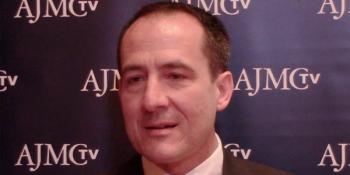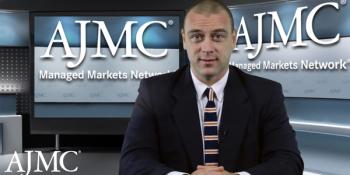
Insurance
Latest News
Latest Videos

CME Content
More News

Instead of the 30-day hospital readmission indicator used by CMS to rate hospital quality and levy penalties for excessive unplanned readmissions, shorter intervals of 7 days or fewer are more accurate measures, according to a new study.

Increase in Medicare spending on hospice care from 2007 to 2015 was mainly driven by increases in the number of patients receiving services as per-patient costs remained flat, a new study found.

In conjunction with the state of Vermont, CMS announced the Vermont All-Payer Accountable Care Organization (ACO) Model on Wednesday. The new model is the first of its kind and represents an advancement in the goal of redesigning the healthcare delivery system with an emphasis on high-value care and improved health outcomes.

This week, the top stories in managed care included an announcement that premiums on Obamacare plans are set to increase by 25% on average, a discussion of Medicare Advantage growth at America's Health Insurance Plans' National Conference on Medicare, and recommendations for success with the Oncology Care Model.

What we're reading, October 28, 2016: Medicare blocks some efforts to automatically move customers eligible for Medicare into Medicare Advantage; the first lung cancer vaccine developed in Cuba will be tested in the US; and American Red Cross and Teladoc partner for disaster relief.

The findings highlight the need for collaborative care, which has support in the proposed 2017 Medicare Physician Fee Schedule.

Healthfirst's Medicare Advantage members are largely low income, and actually poorer than its Medicaid members. In order to reach these members and foster trust, Healthfirst makes itself a part of the fabric of the community.

The Affordable Care Act’s changes in payment and reduction in benchmarks in Medicare Advantage raised questions about the future of the program that ended up being unfounded, said Sean Cavanaugh, deputy administrator and director of the Center for Medicare at CMS, during the opening keynote at America’s Health Insurance Plans’ National Conference on Medicare, held October 24-25 in Washington, DC.

One of the positive effects of the Affordable Care Act’s shift to value-based care is that providers and payers are experimenting with a number of new models, so the successful ones are being implemented on a larger scale, according to Andrei Gonzales, director of value-based reimbursement initiatives at McKesson Health Solutions.

A home-based palliative care (HBPC) program tested within an accountable care organization (ACO) demonstrated substantial cost savings and reduced hospital admissions for patients near the end of life, according to a Journal of Palliative Medicine study.

To create flexibility during the transition to the payment system under the Medicare Access and CHIP Reauthorization Act (MACRA), CMS has created something called “pick your pace,” explained Kate Goodrich, MD, director of the Quality Measurement and Value-Based Incentives Group in CMS.

In the keynote speech at the ACO & Emerging Healthcare Delivery Coalition, Mark McClellan, MD, PhD, director of the Duke-Margolis Center for Health Policy, started out by providing a broad picture of Medicare reform before narrowing it down to what is happening on the ground.

Healthcare attorney James M. Daniel, Jr, JD, MBA, explained how healthcare providers will be impacted by CMS’ newly released final rule on the implementation of the Medicare Access and CHIP Reauthorization Act (MACRA) in a session during the second day of the ACO & Emerging Healthcare Delivery Coalition.

The top stories in managed care included Vice President Joe Biden's released his report on the Cancer Moonshot initiative, complaints were filed against 7 insurers for discriminating against people with HIV, and Pfizer announced it plans to launch its Remicade biosimilar in November.

Current work seeks to perfect the algorithm that would someday let the insulin pump automatically make the multitude of delivery decisions that would have been made by a healthy pancreas. Advances are happening alongside a shifting landscape in payer coverage, with advocates worried that they might lack choice amid so much innovation.

Dr. Song is a resident at Massachusetts General Hospital and a clinical fellow at Harvard Medical School. The American Journal of Managed Care presents the award to an early-career researcher whose achievements show the potential for exceptional long-term contributions in the field of managed care.

Today, federal officials released the final rule for the Medicare Access & CHIP Reauthorization Act (MACRA), which will overhaul the way doctors are paid. To understand what this rule means to the future of value-based healthcare, join The American Journal of Managed Care October 20-21, 2016, in Philadelphia for the fall meeting of its ACO & Emerging Healthcare Delivery Coalition.

To discuss the progress in care collaboration and also what is currently lacking in care practices in oncology, The American Journal of Managed Care® invited Rebekkah Schear, MIA, LIVESTRONG Foundation, and Michael Kolodziej, MD, Flatiron Health.

In creating the final rule for the Medicare Access and CHIP Reauthorization Act, CMS did an excellent job listening to, and responding to, a vast array of comments from healthcare stakeholders.

This week, the top stories in managed care included HHS releasing the final rule for the Medicare Access and CHIP Reauthorization Act, a commentary on the downside of drug coupons, and the World Health Organization called on countries to enact a soda tax.

HHS has finalized the landmark Medicare Access and CHIP Reauthorization Act (MACRA), which reforms payment for Medicare providers and replaced the sustainable growth rate formula.

The authors aimed to examine whether participation in Medicare managed care, compared with fee-for-service, has any effects on racial/ethnic disparities in diabetes care and healthcare expenditures among older adults.

Payment reform in the United States is moving quickly, but there are still a lot of unknowns among providers. Meetings like the ACO & Emerging Healthcare Delivery Coalition help accountable care organizations (ACOs) and providers share best practices and figure out how to succeed, said Mark McClellan, MD, PhD, director of the Duke-Margolis Center for Health Policy and keynote speaker at the ACO Coalition's fall meeting in Philadelphia, Pennsylvania, October 20-21. Learn more about the meeting and register.

The pay-for-performance deal comes as Januvia faces increased competition from newer drug classes, especially SGLT2 inhibitors and GLP-1 receptor agonists.

A retrospective study in breast cancer patients suggests that patients can lower their out-of-pocket costs by speaking with their oncologist about alternate treatments that may be equally effective and understanding the drug coverage policy of their insurance plan.





